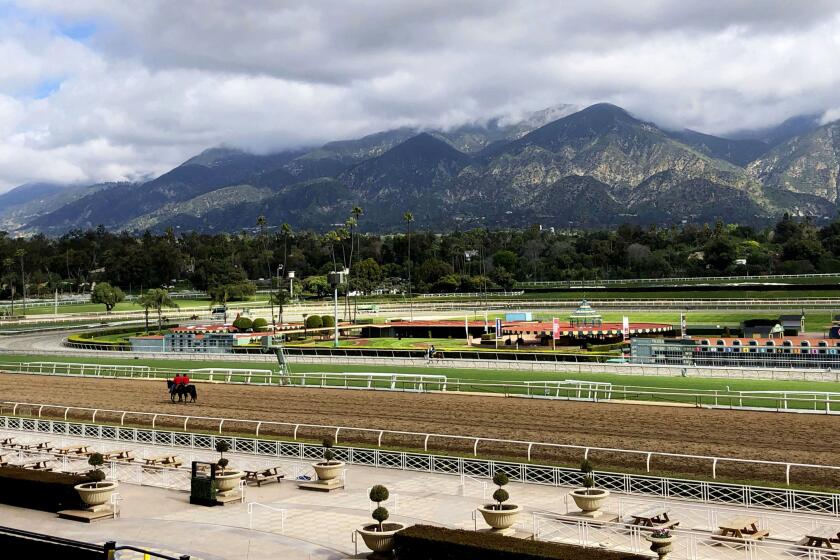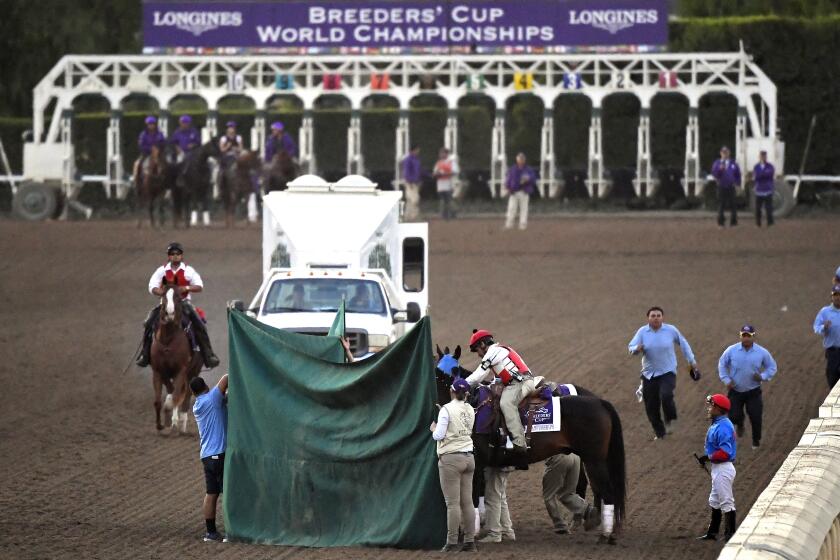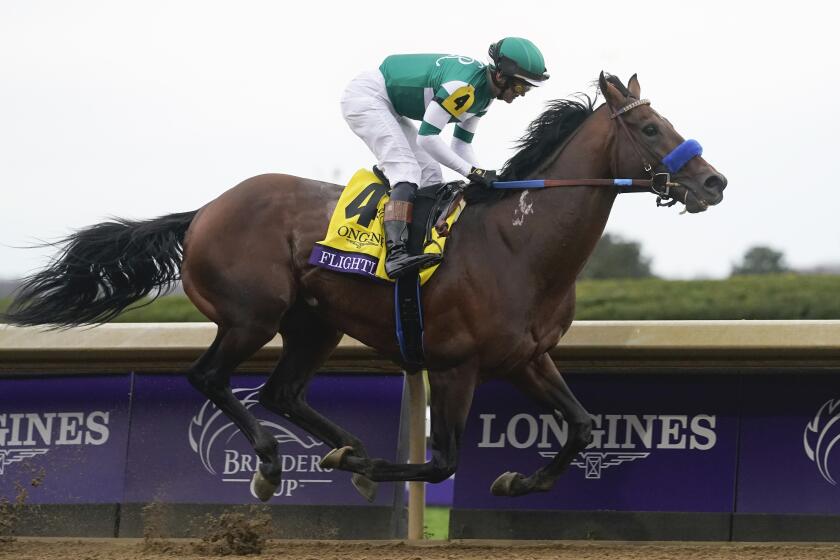Santa Anita opens signature meeting amid worries over FedEx horse shipping shutdown
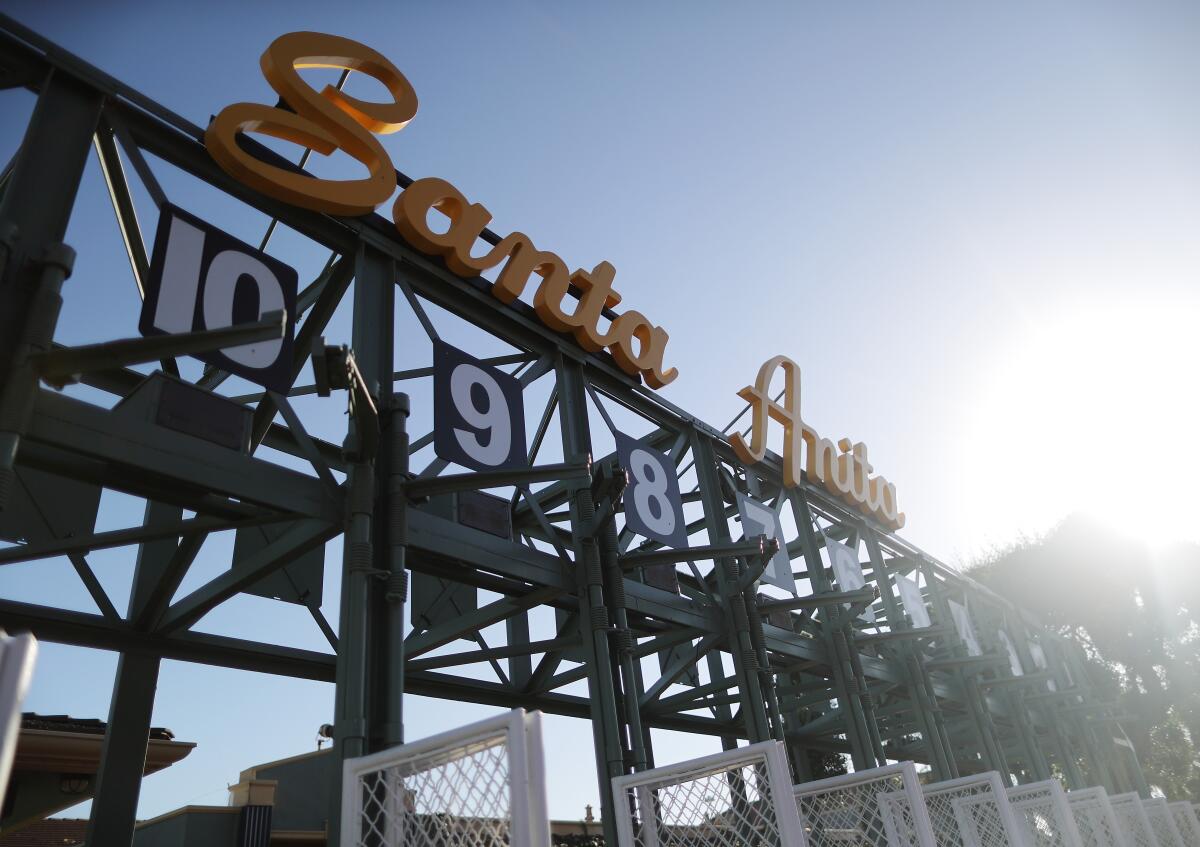
- Share via
Near the end of the 1999 movie “Runaway Bride,” Julia Roberts, hops on the back of a FedEx truck fleeing yet another potential marriage.
Those in attendance are dumbfounded but not surprised. The character played by Rita Wilson, the potential groom’s ex-wife, asks her husband, and the groom’s editor, played by Hector Elizondo: “Where is she going?”
Elizondo responds: “I don’t know, but she’ll be there by 10:30 tomorrow.”
If only it were that simple today.
FedEx is now the only major air carrier that moves horses, but that takes a back seat to moving parcels come December. It suspended transporting horses from Dec. 3 through Christmas.
The closure of Golden Gate Fields is just one problem California horse racing faces. Non-competitive purses and a sinking foal crop paint a tough picture.
This is important because Santa Anita opens its signature meet Tuesday with three Grade 1 and three Grade 2 stakes races. A trainer who wants to ship in for a big race is not likely to want to move their horse three weeks early, which would have been the case with FedEx.
Of the 89 horses currently entered, only five are what would be considered traditional shippers, two for Brad Cox and one from Rodolphe Brisset, Ben Colebrook and Michelle Lovell. All are primarily located in Kentucky and Louisiana.
Until 2021, Tex Sutton was the main air transport company for horses, but it lost its lease on a jet and the racing industry has been scrambling since.
“I think it’s a problem throughout the country, not just a California problem,” said Craig Fravel, executive vice chair of racing and gaming for the Stronach Group, which owns Santa Anita. “There are significant challenges because there just isn’t an infrastructure of moving horses around. It’s something as an industry to figure out and a way to overcome it.
“When Tex Sutton went away, it removed a nice industry asset that is dedicated in many ways to what we do. It’s so expensive to move horses around it does force you to depend a little more on your native population.”
Looking for a solution from within the industry is not likely to instill a lot of confidence in the public. After all, it still hasn’t figured out how to prevent running simulcast races at the same time, even when the tracks are owned by the same company.
The size of a race horse and its natural instincts make it nearly impossible to survive serious injuries at the track, but many are trying to improve the odds.
Shipping isn’t as big of a problem on the East Coast because so many tracks are clustered in the northeast and horses can be vanned. California is often referred to as an “island” because it is so far away from most other comparable racing.
Shipping a horse by plane is not an inexpensive proposition. It’s a hugely varying scale based on how far you are going and how many horses you are shipping. But figure a horse coming from the East Coast to Santa Anita is going to cost in the $3,000 to $4,000 range, and that’s just one way.
Opening day at Santa Anita is one of the three biggest days of the six-month season, along with the Santa Anita Handicap in March and Santa Anita Derby in April . Tuesday’s 11-race card starts at 11 a.m.
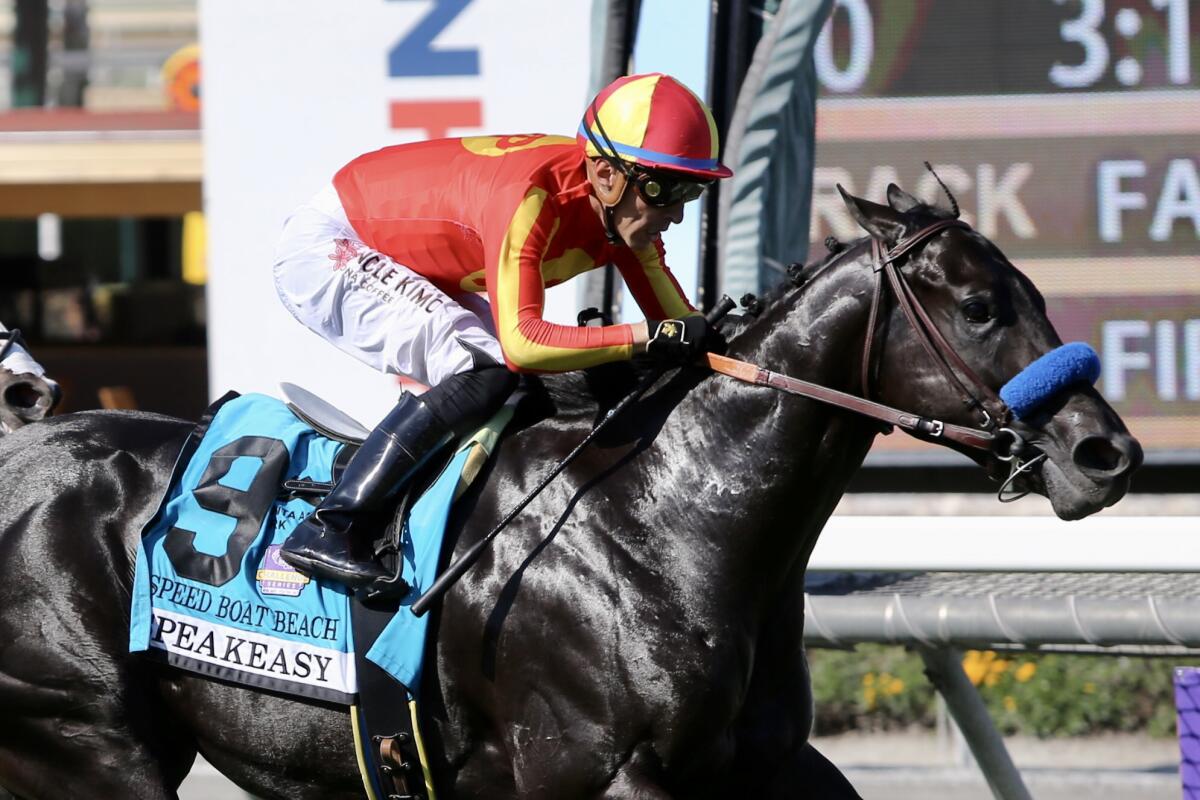
This year’s opener does not have the sizzle of the last two years. In 2022, there was the return of Taiba, making an outside bid for 3-year-old horse of the year, and the debut of Frankie Dettori to the Santa Anita jockey colony in what was billed as his last year. He changed his mind and will be back Tuesday.
In 2021, it was about seeing Flightline, said by some as the best horse since Secretariat, making his third start while winning the Malibu Stakes by 11 ½ lengths.
This year, not so interesting.
Four of the six stakes are for 3-year-olds in their last race at that age before all horses turn a year older on Jan. 1. So, what happened to this year’s 3-year-old crop? Mage, winner of the Kentucky Derby, retired. Arcangelo, winner of the Belmont Stakes and Travers Stakes, retired. National Treasure, winner of the Preakness Stakes, was nominated to the Malibu Stakes and San Antonio Stakes (open to older horses) but wasn’t entered in either race.
Breeders’ Cup Classic champion Flightline has been retired to stud at Lane’s End Farm after winning all six career races in impressive fashion.
The seven-furlong Grade 1 $300,000 Malibu Stakes is perhaps the most interesting race with three Bob Baffert-trained entries, Speed Boat Beach (5-2 morning line favorite), Fort Bragg (3-1) and Hejazi (3-1), a $3.55 million purchase. The female equivalent of the Malibu is the La Brea Stakes, which also is evenly matched with Clearly Unhinged (3-1) as the favorite for Michael McCarthy.
The other Grade 1 is the American Oaks, 1 1/4 miles on the turf for 3-year-old fillies. Anisette is the 8-5 favorite for Leonard Powell.
The Grade 2 races are: the San Gabriel Stakes, for 3-year-old and up going 1 1/8 miles on the turf; the San Antonio Stakes for horses going 1 1/16 miles; and the Mathis Mile for 3-year-olds on the turf.
More to Read
Go beyond the scoreboard
Get the latest on L.A.'s teams in the daily Sports Report newsletter.
You may occasionally receive promotional content from the Los Angeles Times.
